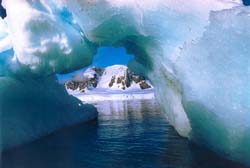Russian scientists drill Antarctica to the bottom
Antarctica is the world's most secure bank

A scientist is keen on drilling deeper wells in Antarctica if he happens to explore the ice-clad continent. One of the projects dealing with the scientific drilling in Antarctica is called European Project for Ice Coring in Antarctica. Scientists analyzed the core samples taken from a depth of more than 3,000 meters. The most important results have to do with the present-day concentration of carbon dioxide and methane in the earth's atmosphere, which showed the highest levels for the last 650,000 years. 
Antarctica is the world's most secure bank. The Antarctic ice is especially valuable because the air bubbles frozen in the ice keep intact the air makeup since time immemorial. EPICA project involved participation of 10 European countries. Scientists drilled to 3,270 meters or the equivalent to 900,000 years traveled backwards in a time machine.
Russian scientists have drilled the ice to nearly 3,700 meters reaching the time equivalent of 440,000 years. The drilling is conducted above the underground lake in the vicinity of the Russian station Vostok. Russian scientists intend to continue drilling though the main objectives of their research are glaciology and paleontology. They are going to reach the underground lake after drilling the last 130 meters. The underground lake may have some unknown life forms.
“The concentration of carbon dioxide is 30% higher today than in any era examined by ice core samples while the level of methane is 130% higher,” said Tomas Stocker at the University of Bern. “The gas concentration rate has increased spectacularly, these days it is 200 times higher than it was 650,000 years ago. The findings prove that carbon dioxide plays an immense role in the formation of climate on Earth,” added he.
The highest concentration of green gases over the last 650,000 years brings out quite a bit of confusion in terms of climate change forecasting. After analyzing the core samples from Antarctica, European glaciologists concluded that the present warming period equaled the interglacial period that took place 400,000 years ago and lasted for 28,000 years.
Scientists are still in disagreement over the alleged link between the concentration of carbon dioxide and climate change. Corresponding member of the Russian Academy of Sciences Andrei Kapitsa is confident that increasing levels of the carbon dioxide does not result in the greenhouse effect. Many scientists of note believe that man-made gas emissions can not lead to changes of the earth's thermal conditions. There is a different kind of dependence revealed by climate restoration technique on the basis of various data including those of the Antarctic core samples.
The warming caused by different reasons led to an increase in the concentration of carbon dioxide in days of old. Perhaps the circumstance can be explained by the fact that 95% of all carbon monoxide is dissolved in the ocean. The higher goes the temperature, the less gas water can retain. Once the warming period sets in, the ocean begins to breathe and “spit out” carbon dioxide in amounts that defy imagination. The findings of the Russian drilling operation in Antarctica indicate that climate warming always preceded the increase of carbon dioxide in the earth's atmosphere. The findings contradict the greenhouse effect theory and scientific foundations the Kyoto protocol is based upon. Notwithstanding the findings, the fight for gas emissions reduction and clean atmosphere is still worthwhile.
Discuss this article on Pravda.Ru English Forum
Subscribe to Pravda.Ru Telegram channel, Facebook, RSS!


